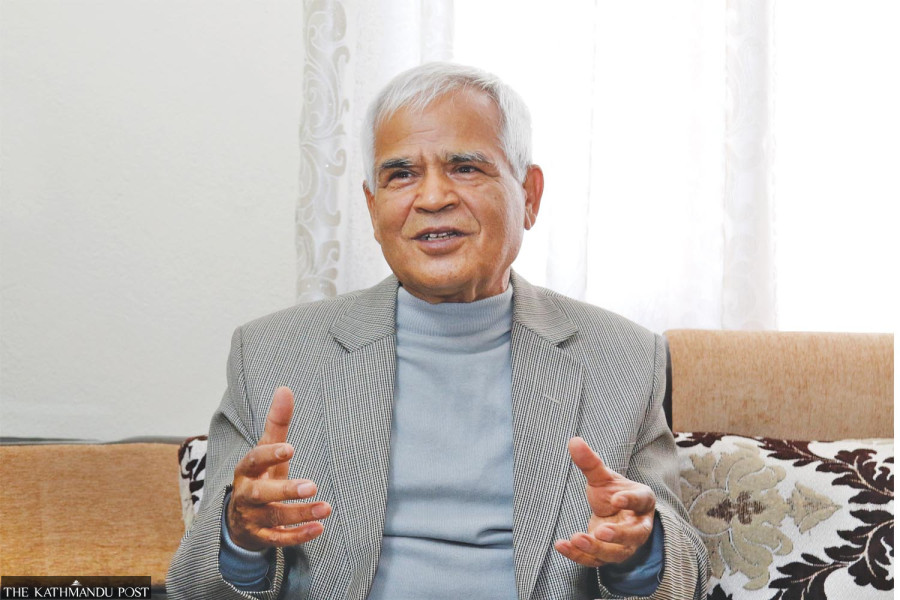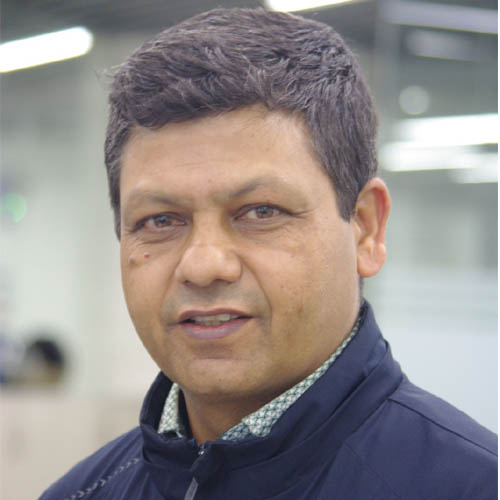Interviews
Constitution should be amended only to remove difficulties in implementation
A special parliamentary committee can be entrusted with the responsibility of reviewing statute implementation and working out the issues to be addressed.
Thira Lal Bhusal
It has been five months since the Nepali Congress and the CPN-UML formed a coalition government on July 15 by stepping on the seven-point deal inked on July 1. How is the coalition of the two biggest political parties faring? The Post’s Thira Lal Bhusal sat down with Krishna Khanal, a professor of political science, for his insights.
How do you evaluate the performance of the Congress-UML government based on the pledges they made at the time of coalition formation?
Two biggest parties getting together to form a government is a bit unusual in the system we have adopted. The strength of the system is that the government can be made accountable by a strong opposition. But when the two biggest parties join hands to run the government, the opposition in the House becomes weak. This is a concern. The Congress and the UML have had joint governments in critical junctures in the past. Now, there is no extraordinary situation requiring them to forge a coalition but they justified it saying it would end political instability. Their argument was that unreasonable bargaining of smaller parties made the prime ministers weak. That’s partially true. However, the crux of the matter is that they wanted to enjoy consolidated power. KP Oli wanted to be prime minister and the Congress leaders who were out of power wanted to return to Singha Durbar. So they signed the seven-point deal with the pledge of amending the constitution.
Has this coalition been a success? What are the initial indications?
There are certain curious things. The seven-point agreement doesn’t say the UML will hand over government leadership to the Congress in the second phase of their partnership. It says, after two years, UML chair Oli will hand it over to Congress President Sher Bahadur Deuba. It shows how our parties have become leader-centric instead of institution-centric. After all, Oli and Deuba are the chiefs and parliamentary leaders of their respective parties and they are the ones who will lead the government.
Still they wished to specifically mention their names, which indicates they still feel insecure. Likewise, Prime Minister Oli says that he is handing over power to Deuba in July 2026. Recently he said he is handing it over after 18 months. Despite there being a written agreement, he keeps repeating the timeline. This suggests mutual mistrust due to past records of betrayal.
It is true that the Congress and the UML together have a strong majority in the House and, with the backing of a few other smaller forces, they can manage two-thirds majority needed to amend the constitution. But when it comes to political issues, even the small parties in the coalition are hardly on the same page. So numerical strength alone won’t work. Hence there has been no progress on constitution amendment in the past five months. These pledges were made just to create a pretext to get to power.
Is the present government any different to the erstwhile Dahal-led coalition, particularly on delivery?
No. In the seven-point agreement, they pledged to improve the ailing economy. We don’t find any reform and the economy is still stagnant. I can’t recall a single thing this government has done that is worth appreciating. The only thing this coalition has achieved is ending unusual power manoeuverings by Prachanda [Maoist Centre chair Pushpa Kamal Dahal]. The way Dahal was switching alliance partners between the Congress and the UML was unnatural. The present coalition ended the trend, at least for now. Also, some unhealthy activities taking place in provinces have been stopped. But the government has utterly failed to provide any relief to the people.
What about the process of amending the constitution?
The Congress and the UML leaders have often blamed the proportional representation (PR) electoral system for the country’s political instability. The UML proposed to limit the scope of the PR system to the National Assembly and some Congress leaders have also floated this idea. After the formation of this government, many people assumed that this coalition may take some action to implement those propositions. But doing so is not easy. Despite a strong majority in the House, the Congress and the UML alone can’t amend the constitution. Other small parties won’t support them to water down the PR system. The top leaders are conspicuously silent as they know diverse issues are going to open up once they start the process.
For instance, the Rastriya Prajatantra Party wants to revive Hindu monarchy and the Madhes-based parties have their own grievances. Moreover, if you analyse the election results since 2008, it’s not difficult to infer that not only small parties but even the major forces will think twice before making any changes to the PR system. Be it big or small, old or new parties, all have gotten a significant number of seats under the PR category. In the first Constituent Assembly election in 2008, the Congress and the UML were in crisis. It was the PR system that saved them from being pushed into an existential crisis. Besides that, there is one big political reason behind the adoption of this electoral system and that is to ensure representation of various underprivileged communities in state organs. We can’t forget that context. Hence the Congress and UML leaders have been silent on the constitution amendment in the past couple of months.
Is there any need to review or amend the constitution?
There is a need to seriously review and analyse the problems faced in the course of implementing the constitution in the past nine years. For instance, the vice-president has no role. He can be made ex-officio chair of the National Assembly, as in India. Then, the state doesn’t need to elect the upper house chair. This option was discussed during constitution writing as well. Recently, we conducted by-polls to fill the vacant positions of chiefs of local units. These polls were unnecessary as there can be a provision to entrust the deputy chiefs with the responsibility of carrying out the chief’s duties when the position goes vacant.
There is a need for a comprehensive review and changes in some provisions based on the practical experience of statute implementation. But there are different parties and groups that want to raise different political agendas. For instance, some want a more powerful federal system while others want to scrap the system and revive Hindu monarchy.
How should we review the national charter and what kind of mechanism will be right for that?
The best way is through a review commission composed of politicians and subject experts. But leaders don’t trust independent experts who don’t follow their instructions. Forming a body of experts loyal to the leaders is meaningless. Therefore, a special parliamentary committee can be entrusted with this task. The panel will be composed of members from political parties based on their strength in the House. The parties and other stakeholders can submit their formal proposals to the committee and the experts can give their inputs to the same panel.
The body can help give shape to the ongoing debates and discussions will take place in a more organised and formal way. It can conduct a thorough study of the complications seen in the course of constitution implementation. My emphasis is not on amending the constitution on political grounds but from the perspectives of removing difficulties experienced in the course of implementation. For instance, provinces have failed to prove their relevance. Now, we need to study where the problems are. But I don’t think the political parties are going to work on this issue with the seriousness it deserves.
Leaders, of late, have proposed to increase the threshold to secure seats under the PR category, which can be done by amending election laws.
They have floated the idea of increasing the PR threshold to five percent. [At present, it is three percent at the federal and 1.5 percent at the provincial level]. If it is increased to five percent, hardly four or five political parties may qualify for the PR seats. So this is not an appropriate proposal. To ensure political stability, we have to instead develop a system supportive of a coalition culture. The problem lies in our leaders and not in the constitution. For instance, why did Prachanda switch alliances multiple times after the last election? There is no point in blaming the system for instability. To discuss and debate all these issues, we need a review body.
What is your analysis of the recent local by-polls results?
The voting pattern shows that the big parties couldn’t increase their vote shares and failed to attract voters. The Congress lost more seats in comparison to the last by-polls. The UML had mixed results while the Maoist Centre made some gains. As it fought single-handedly this time, the Congress lost some seats that it had won with the support of alliance partners last time. This is natural. The Maoist Centre appears to have benefitted by being in the opposition and as it concentrated its strengths in select areas for the past few months. Party chief Dahal himself visited some remote local units.
The Congress doesn’t appear serious about reviewing its poor performance while the UML has decided to study the matter and find what went wrong. The Maoist leaders look excited but the party has not made much progress in popular votes. There are assumptions of some informal collaborations between the Maoist Centre and the Rastriya Swatantra Party. The way Dahal has defended Rabi Lamichhane in recent days backs the assumption.
Why do you think the performance of new forces including the RSP and Janamat were poor in the by-polls?
My assumption is that voters rethought the need to change the party of their choice if the main objective of the leaders from new parties is to be ministers. RSP chief Rabi Lamichhane insisted on becoming home minister. In the meantime, recent investigations have shown his linkages to cooperative scams. People might have thought that he is not a clean person. These factors might have played a role. Last time, people supported new forces not to make their leaders ministers but for political reforms.
The chief minister from Janamat Party who is leading the provincial government in Madhesh formed a 20-member Cabinet, which is the biggest ever there. He downsized it only after severe criticism. Such developments certainly play a role in elections. These are just assumptions. We can’t jump to conclusions but it is safe to say that Nepali voters are consistently trying to find better alternatives.
While there were reports of former President Bidya Devi Bhandari rejoining the UML to return to active politics, former Vice-President Nanda Bahadur Pun is most likely to join the Maoist Centre. What kind of precedent will this set?
I don’t see serious problems in former vice-presidents rejoining active politics as they don’t play any vital role as vice-presidents. But the issue of former Presidents returning to active politics is serious as such a precedent will invite serious anomalies. Though the constitution and laws don't bar former presidents from making such a comeback, politics should be guided by certain values, principles and convictions. Bhandari’s return to active politics will be unfortunate. It should be stopped.




 10.97°C Kathmandu
10.97°C Kathmandu












